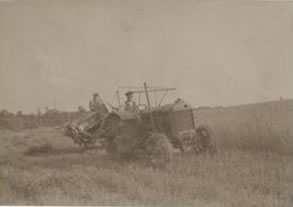(This page has been copied from the BBC's WW2 People's War website, originally found athttp://www.bbc.co.uk/ww2peopleswar/stories/63/a2773163.shtml - this site is being deleted by the BBC as part of its cuts and without this copy, this page would have been lost from the internet for good.)
Contributed by: John Fuller
People in story: John Fuller, Arthur Fuller, George Fuller
Location of story: Goddards Farm, Thaxted Essex
Background to story: Civilian
Article ID: A2773163
Contributed on: 23 June 2004
 My father and grandfather cutting the corn - August 1940, Goddards Farm, Thaxted, Essex
My father and grandfather cutting the corn - August 1940, Goddards Farm, Thaxted, Essex
A summer day in Essex
It was a glorious summer day and the sky was dotted with cumulus clouds.
My father and granddad, with the farm workers, had been cutting the corn in a field about half a mile from the farmhouse. At the age of eight it was exciting for me to see the many rabbits running away from the corn as it was being cut by a binder pulled by a tractor.
Lunchtime approached and everyone returned to the farm for refreshments before tackling the next job of the day: milking the cows. I asked my dad if I could return to the harvest field to play on the tractor and binder. He agreed and off I went, back to the field to play at being a farmer. I did not know at that moment what the time was, but I have since learned that it was 3.15pm on 26 August 1940.
Aircraft approaches
Sitting on the binder seat I noticed, about a mile away, Hurricane aircraft flying over Debden airfield. A few minutes later I saw little puffs of smoke in the sky. I was excited to see what I thought was a wartime exercise.
Minutes later I heard machine-gun fire and an engine roaring behind me. I turned around and suddenly, from behind a fluffy cumulus cloud, a German aeroplane emerged with jet-black smoke pouring from one of the engines. The plane was diving towards me. I was terrified, thinking that I was going to be machine-gunned. I partly jumped and partly fell from the binder seat and then froze with fright as the plane, screaming above my head, crashed into the next field, about 200/300 yards away, with a terrific explosion. The time was 3.30pm.
My father was in the crew-yard and saw the plane crashing, and was convinced it had come down in the field where I was playing. He ran to the field to find me hysterical, trying to climb over the gate to escape the horror of what I had just witnessed.
My dad, who was a member of the ARP (Air Raid Precaution), spent some minutes calming me down and then told me he had to go to the crashed plane to see if there were any survivors. I cowered behind him as we walked to what remained of the plane. I stood by the hedge crying while my dad approached the smouldering plane. He searched the wreckage for what seemed like an eternity. Eventually we left the site to return to the farmhouse. I know that my dad had found the remains of the pilot or co-pilot and also a wallet containing a photo of one of them with his wife and young child (from what I remember a daughter) who was probably a little younger than me.
Two of the aircrew bailed out and my grandfather, armed with his shotgun, arrested one of them while another farmer arrested the other.
As a result of this dreadful experience I did not attend school for almost a year.
What happened to the little girl?
Over the years I have often wondered what became of the two survivors, and more so the young child in the photo my father had found. I didn't know even how to begin a search to enable me to make contact with the families.
I thought that I would never realise my quest to find the families. But then, on 22 September 2003, I was involved in an Anglia TV programme called 'Going Home'.
During the filming I related the story of the wartime German plane crash. Two days later I was contacted by a historian specialising in crashed warplanes, who was able to provide me with details of the Dornier 17 and, more importantly, the names of the aircrew.
Delighted with this information I contacted the German War Graves Commission, but due to the data protection act I was unable to progress. Undaunted I decided to write to Gerhard Schröder, the German Chancellor, to see if he could see me through the data protection act. I await a reply.
This is one of my wartime stories. If I can eventually make contact with that little girl in the photo, maybe another wartime story can be told - by her.
© Copyright of content rests with the author.



